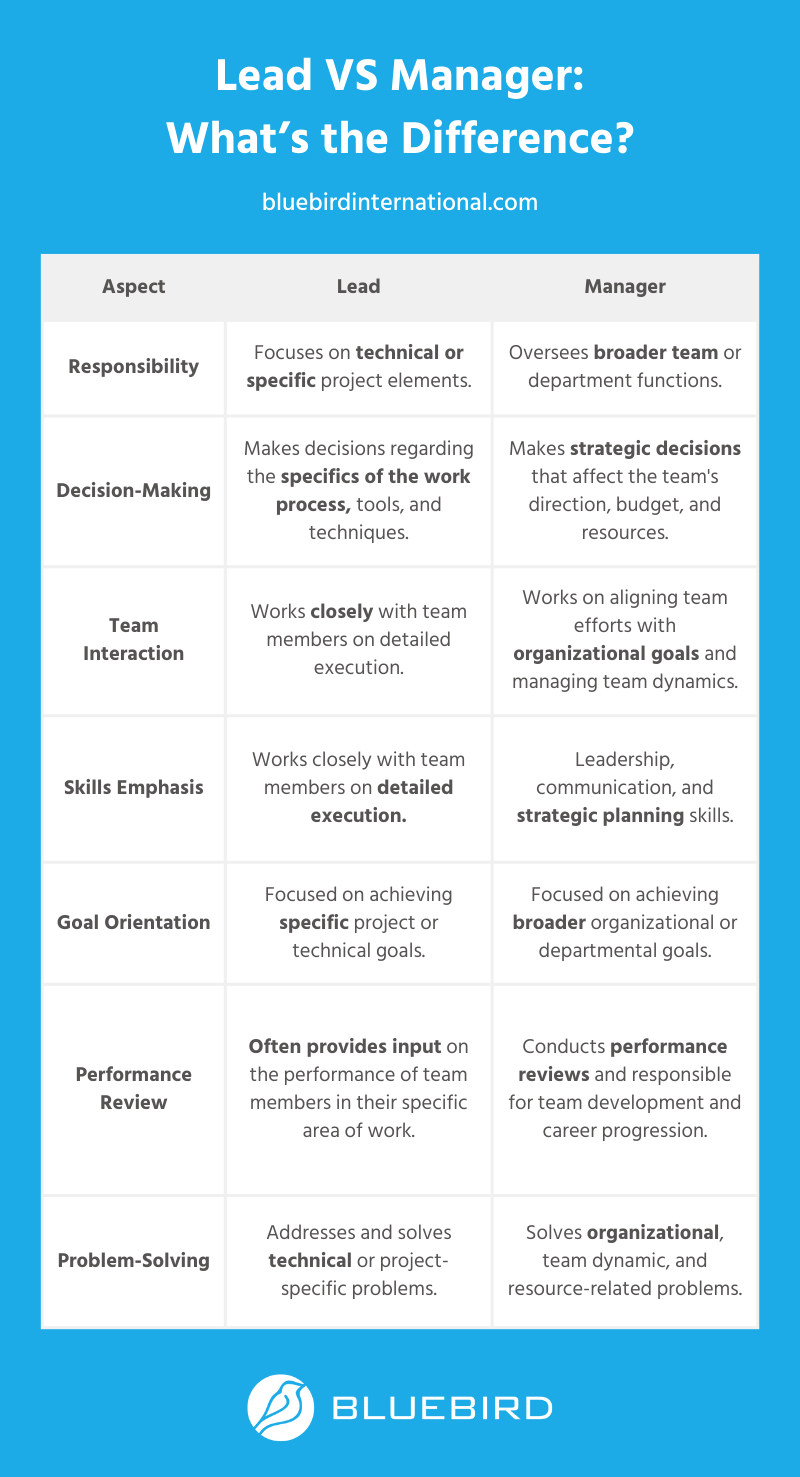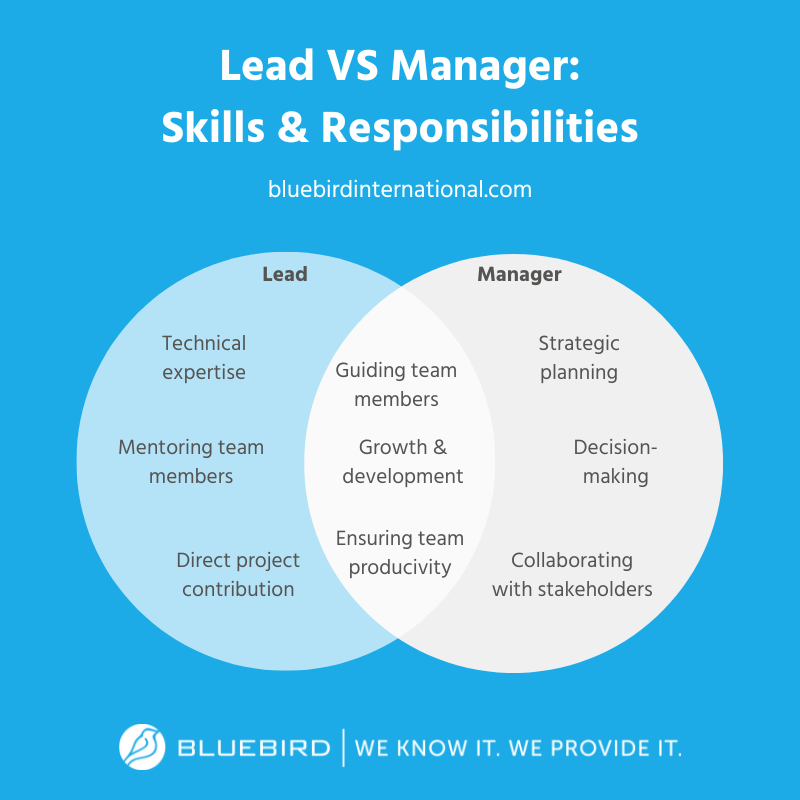Lead vs manager: Curious about these roles? Look no further. A side-by-side comparison highlighting differences, similarities, career paths, and more.
More...
While both leads and managers are responsible for leading a team, leads are more technically oriented and focus on developing hard skills, while managers have a more strategic role in negotiating business goals and strategy.
Leads (team or technical leads) focus on the technical direction of projects, providing expertise, overseeing quality, and mentoring team members. They remain hands-on, tackling complex problems and technical solutions.
Managers, such as project or department managers, oversee broader aspects like team leadership, resource allocation, and strategic alignment with organizational goals. They manage administrative tasks and are responsible for setting objectives and maintaining a productive work environment.
With this overview in mind, let’s see the differences between the role of a (team) lead and a manager, touching on responsibilities, required skills, career progression, and more!

Lead vs Manager: Differences Between Lead and Manager
While leads and managers both play vital roles in leading teams, there are important distinctions between the two positions.
Leads are primarily focused on the technical aspects of the work, leveraging their expertise to guide and support their team members. On the other hand, managers have a broader understanding of the project or business and possess the authority to make decisions that impact the entire endeavor.
Team Lead | Manager | |
|---|---|---|
Focus | Technical Aspects | Strategic Objectives |
Authority | Requires Managerial Approval | Final Decision-Making Authority |
Responsibilities | Day-to-Day Team Management | Strategic Planning and Oversight |
Skills | Technical Expertise, Monitoring | Project Management |
Differences in Focus and Authority
Leads excel in their technical prowess and possess in-depth knowledge in their respective domains. They actively participate in code reviews, contribute to the development process, and mentor junior team members. Their main goal is to ensure that the technical aspects of the project are executed flawlessly.
Managers, on the other hand, focus on the strategic elements of the project or business. They work closely with stakeholders to define goals, manage resources, and establish the overall direction of the team. Managers have the authority to make critical decisions that impact the entire project, ensuring that it aligns with the organization's objectives.
Roles and Responsibilities
Leads typically have a narrower scope of responsibility, focusing on the day-to-day management of their team. Their responsibilities may include assigning tasks, monitoring progress, conducting performance evaluations, and providing guidance to individual team members. Leads collaborate with other leads and managers to ensure successful project execution.
Managers have a more comprehensive set of responsibilities. They oversee multiple teams, ensuring that each one is aligned with the organization's strategic goals. Managers deal with various operational aspects, such as budgeting, resource allocation, and risk management. They also handle performance evaluations, career development, and resolving conflicts within the team.
Skills and Expertise
The skills required for a lead vs manager differ due to the nature of their roles. Leads need a deep understanding of the technical aspects of the project, proficient coding skills, and the ability to guide and mentor team members effectively. They should also possess strong communication and collaboration skills to effectively work with other teams and stakeholders.
Managers need a broader skill set. Alongside technical knowledge, they must excel in strategic planning, decision-making, and project management. Excellent communication and interpersonal skills are essential to effectively collaborate with stakeholders and lead their teams towards achieving business objectives.
Authority and Decision-Making
Leads typically have less authority compared to managers. While they play a critical role in the development process and team management, they often need managerial approval for decisions that extend beyond their immediate area of responsibility. Managers have the final authority and make decisions that impact the overall project or business.
Product Manager Vs Program Manager

Lead vs Manager: Comparison of Responsibilities
Team leads and managers each have distinct responsibilities and require different skill sets to effectively carry out their roles.
Team Lead Responsibilities
Team leads are responsible for the day-to-day management of a team. Their primary focus is on guiding and supporting their team members, ensuring that projects are completed successfully and on time. Some of the key responsibilities of team leads include:
Manager Responsibilities
Compared to leads, managers have a more strategic role, focusing on setting goals, managing resources, and making decisions that align with the overall business objectives. Some of the key responsibilities of managers include:
Lead vs Manager: Comparison of Skills
Skills Required for Leads
Technical Expertise: Profound knowledge in their specific technical field is crucial.
Leadership and Mentoring: Ability to lead by example and mentor team members in technical matters.
Communication: Effective communication skills, especially in explaining complex technical concepts.
Adaptability: Quick problem-solving abilities and adaptability to changing technical demands.
Skills Required for Managers
Leadership and Vision: Strong leadership skills with a focus on strategic vision and goal-setting.
Resource Allocation: Proficiency in managing diverse resources and prioritizing effectively.
Communication and Negotiation: Excellent communication and negotiation skills for stakeholder management.
Problem-Solving and Decision-Making: Ability to make critical decisions and solve problems considering the broader business impact.
In essence, team leads focus more on the immediate, technical aspects and team dynamics, requiring deep technical knowledge and hands-on leadership, while managers have a more strategic focus, involving resource management, decision-making, and cross-functional communication.
Lead vs Manager: Prevalence of Lead and Manager Roles Across Industries
The prevalence of lead and manager roles varies across industries based on the nature of the work, organizational structure, and the focus of the business.
Lead roles are more prevalent in industries and sectors where technical expertise, project direction, or specialized knowledge is crucial, focusing on guiding the execution of work within specific domains.
Manager roles are more widespread across all industries, focusing on broader organizational, strategic, and resource management responsibilities. The prominence of each role varies by industry, reflecting the specific needs and structures of those sectors.
Technology and Software Development
Lead Role: Highly prevalent. Technical leads, such as development leads or engineering leads, are common in this industry. They focus on the technical direction of projects, mentoring developers, and ensuring the quality of code or systems.
Manager Role: Also prevalent but with a different focus. Project managers, product managers, and IT managers handle the strategic, resource, and team management aspects, aligning projects with business goals.
Healthcare
Lead Role: Common in specialized areas such as research, clinical leads, or technical leads in medical technology. These roles focus on technical expertise and leading specific initiatives or research projects.
Manager Role: More common in administrative, operational, and departmental management. Healthcare managers or administrators oversee facilities, services, staff, and compliance with regulations and policies.
Manufacturing and Engineering
Lead Role: Prevalent in the form of team leads or project leads who focus on overseeing specific engineering projects, production lines, or R&D initiatives.
Manager Role: Also widespread, with roles like plant managers, production managers, and quality managers focusing on overseeing operations, ensuring production targets are met, and managing resources.
Financial Services
Lead Role: Less common as a technical lead but may exist in areas like financial technology or analytics, focusing on leading specific financial products or technology solutions.
Manager Role: Highly prevalent, with roles such as branch managers, finance managers, and risk managers overseeing various aspects of financial operations, strategy, and compliance.
Retail and Consumer Services
Lead Role: Can be found in areas such as merchandising leads or store team leads, focusing on specific areas of the business or projects.
Manager Role: More common, with store managers, district managers, and operations managers overseeing the operations, staff, and strategy of retail locations or service areas.
Creative Industries (Media, Design, and Arts)
Lead Role: Prevalent in the form of creative leads, design leads, or project leads, focusing on the creative direction and execution of projects.
Manager Role: Exists as well, with positions like studio managers, art directors (who also often play a lead role in the creative direction), or production managers overseeing operational and strategic aspects.
Lead vs Manager: Which Role is Right for You?
Choosing between a career as a lead or a manager depends on your interests, skills, and career goals. Each role offers unique opportunities for professional growth and development. Consider your strengths and passions to determine the path that aligns best with your aspirations.

If you enjoy technical work and have a passion for mentoring others, a career as a lead may be a good fit for you.
As a lead, you will have the chance to showcase your technical expertise, guide your team members, and contribute directly to the success of projects. Your focus will be on developing strong technical skills and ensuring the team's productivity and cohesion.
On the other hand, if you thrive on strategic planning, decision-making, and collaborating with stakeholders, a career as a manager may be a better fit.
Managers take on a broader role than team leads, overseeing the work of multiple teams and working closely with stakeholders to achieve business objectives. As a manager, you will have the opportunity to shape the direction of projects and contribute to the overall success of the organization.
Ultimately, the choice between becoming a lead versus a manager depends on your personal preferences and long-term career goals. Consider what motivates and excites you the most, and aim for a role that allows you to maximize your potential and make a meaningful impact in your field.
Lead Vs Manager: Career Trajectories
Please note that job titles and their associated responsibilities are not universally standardized across different organizations. For instance, the role of a team lead in one company might entail a different set of duties compared to that in another organization. Similarly, the role of a manager may cover a range of responsibilities that overlap with other senior positions in distinct companies.
Career Progression for a Team Lead
- 1
Entry-Level / Junior Team Member: Begins in a specialized role, such as software development, engineering, or IT support, focusing on skill acquisition and mastery in a specific domain. If you are looking to advance your career while maintaining flexibility, explore remote part-time jobs for software developers on a platform like Jooble. Such opportunities allow you to refine your skills and progression to higher positions over time.
- 2
Experienced / Senior Technical Role: Progresses to tackle more complex projects and may lead smaller teams or projects, showcasing leadership in their technical field.
- 3
Team Lead: Steps into the Team Lead position, directing project technicalities, guiding team members, and ensuring the successful completion of projects.
- 4
Senior Team Lead / Technical Manager: Advances to manage multiple teams or significant projects, addressing overarching technical strategies and contributing to key technical decisions within the organization.
Career Progression for a Manager
- 1
Entry-Level / Junior Role: Begins in a position related to management, like assistant project manager or roles in operations, sales, or administration, focusing on foundational skills and industry understanding.
- 2
Mid-Level Managerial Role: Advances to manage small teams or projects with increased responsibility, showcasing skills in managing resources and leading teams effectively.
- 3
Manager: Elevates to a formal managerial position, leading larger teams or departments, and is tasked with strategic planning, allocating resources, and ensuring the team's alignment with organizational goals.
- 4
Senior Manager / Director: Moves into senior management, responsible for strategic decisions, overseeing cross-departmental efforts, and playing a key role in shaping organizational strategies and achieving goal.
In summary, the career path for a team lead typically progresses from hands-on technical roles to leadership positions focused on technical direction and team mentorship. In contrast, the managerial career trajectory usually involves a broader scope of responsibilities, transitioning from foundational roles in relevant fields to positions focused on strategic management and organizational leadership.
Lead vs Manager in 2024: Demand for Leads vs Managers
The demand for leads versus managers depends on various factors, including industry trends, technological advancements, and organizational needs. Both roles are crucial, but their demand may fluctuate based on specific circumstances. Let's see some of these:
Industry Trends
Technology and Innovation: In fields like software development, data science, and engineering, there's a strong demand for technical leads who can drive innovation and lead project-based teams.
Business Expansion and Scale: For organizations focusing on growth, restructuring, or entering new markets, managers with strategic planning and cross-functional leadership skills are in high demand.
Technological Advancements
Automation and AI: Automation and AI advancements in 2024 may increase the demand for technical leads who can navigate these technologies, implement new solutions, and lead specialized teams.
Remote Work: The rise in remote and hybrid work models emphasizes the need for managers skilled in remote team leadership, culture building, and digital communication tools.
Organizational Needs
Startups and Tech Companies: Often prioritize technical leads to drive product development, technical innovation, and agile project management.
Large Corporations and Multinationals: May have a higher demand for managers to oversee operations, strategic initiatives, and large-scale projects across various departments.
Market Dynamics
The demand can also vary by geographic region, with certain areas showing a higher demand for technical leads due to a concentration of tech companies, while others may have a stronger need for managers in sectors like finance, healthcare, and government.
In 2024, neither role universally outpaces the other in demand across all industries and regions. Instead, the demand is nuanced and aligned with specific industry needs and organizational growth phases. Candidates who are aiming to increase their marketability should focus on developing a blend of technical and soft skills, leadership abilities, and adaptability to both lead and manage effectively in their chosen field.
Lead Vs Manager: FAQs
Q: What distinguishes a team lead from a manager in terms of project involvement?
Team leads are primarily focused on the technical direction and execution of projects, often working closely with the team on specific tasks. Managers, conversely, oversee the project from a broader perspective, focusing on resource management, planning, and aligning the project's goals with organizational objectives.
Q: Is the position of a lead higher than the position of a manager?
So is lead higher than manager? Whether a lead is considered higher, lower, or equal to a manager depends on how an organization defines these roles. In traditional hierarchies, managers generally have broader administrative and strategic responsibilities that could be considered higher in the organizational structure.
However, in organizations where technical expertise and project leadership are highly valued, leads may hold significant influence and responsibility, reflecting a different kind of hierarchy based on expertise rather than management.
Q: Is leadership a key component for both roles?
Yes, both roles require leadership skills, but the focus differs. Leads need to exhibit leadership in technical problem-solving and mentoring team members. Managers require leadership in guiding the team towards strategic goals, managing resources, and decision-making.
Q: Are leads in a management position?
Whether a lead is considered to be in a management position can vary widely based on how a company defines roles and responsibilities. In some environments, leads have a clear management mandate, including overseeing team members and contributing to strategic planning. In others, their role is more about providing direction and expertise within their area of specialization without formal management duties.
The key differentiator tends to be whether the role includes people management responsibilities and administrative authority over team members.
Q: Lead vs Manager: Is it common for companies to combine lead and manager roles?
It is, especially for startups and smaller organizations. This approach allows them to maximize resources and adapt quickly to changes. In larger organizations or those undergoing transformation, you might also find hybrid roles that blend the tactical focus of a lead with the strategic oversight of a manager.
Identifying such mashups in job descriptions involves looking for certain clues, such as a broad scope of responsibilities, dual focus on projects and people, leadership influence without direct authority, and strategic and technical decision-making in a single role.
Q: How do team leads and managers handle team dynamics?
Leads are more involved in the day-to-day dynamics of the team, directly addressing technical challenges and team collaboration. Managers handle team dynamics at the macro level, focusing on team structure, conflict resolution, and ensuring a productive work environment.
Q: Who has a greater role in defining the team's culture?
Both contribute to the team's culture, but managers usually have a more significant influence in setting the tone, expectations, and overall work environment, while team leads reinforce this culture through daily interactions and technical leadership.
Q: In terms of career development for team members, who plays a more significant role?
Team leads often play a key role in the technical development of team members, while managers are typically responsible for broader career development, including opportunities for growth, training, and professional advancement within the organization.
We hope you enjoyed our article on the differences between the role of a team lead and that of a manager.
If your company is looking for IT professionals and you are interested in IT recruitment or IT staff augmentation, please contact us and we will be happy to help you find the right person for the job.
To be the first to know about our latest blog posts, follow us on LinkedIn and Facebook!
